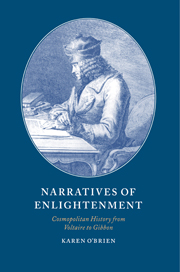Book contents
- Frontmatter
- Contents
- Acknowledgements and author's
- 1 Introduction: cosmopolitanism, narrative, history
- 2 Voltaire's neoclassical poetics of history
- 3 European contexts in Hume's History of England
- 4 William Robertson to the rescue of Scottish history
- 5 Robertson on the triumph of Europe and its empires
- 6 Emulation and revival: Gibbon's Decline and Fall of the Roman Empire
- 7 David Ramsay's sceptical history of the American Revolution
- Afterword
- Bibliography
- Index
- CAMBRIDGE STUDIES IN EIGHTEENTH-CENTURY ENGLISH LITERATURE AND THOUGHT
5 - Robertson on the triumph of Europe and its empires
Published online by Cambridge University Press: 28 October 2009
- Frontmatter
- Contents
- Acknowledgements and author's
- 1 Introduction: cosmopolitanism, narrative, history
- 2 Voltaire's neoclassical poetics of history
- 3 European contexts in Hume's History of England
- 4 William Robertson to the rescue of Scottish history
- 5 Robertson on the triumph of Europe and its empires
- 6 Emulation and revival: Gibbon's Decline and Fall of the Roman Empire
- 7 David Ramsay's sceptical history of the American Revolution
- Afterword
- Bibliography
- Index
- CAMBRIDGE STUDIES IN EIGHTEENTH-CENTURY ENGLISH LITERATURE AND THOUGHT
Summary
Ten years elapsed between the publication of Robertson's first history and the arrival of his second, The History of the Reign of the Emperor Charles V, and he awaited public response with some trepidation. Few of his friends, least of all Hume, had greatly encouraged the project. In the event, apart from a few mutterings from Horace Walpole and an anonymous unflattering article by Boswell, his fears proved groundless, and, in addition to the unusually high sum he received for the work (£3,500 in the first instance, with around £500 for subsequent editions – a considerable improvement on the £600 he received for his first work), he had the joy of a very favourable reception. Robertson's French translator, Suard, thought he had found in this Scotsman a genuine philosophe. Buoyed up by his success, Robertson went on to write a third substantial work, the History of America, the portion of which dealing with the Spanish colonies he published in 1777. His last work, representing yet another new departure, was an extended essay entitled An Historical Disquisition concerning the Knowledge which the Ancients had of India (1791). All of these later histories represent, in different ways, an elaboration of the international themes tentatively explored in the History of Scotland. Robertson's cosmopolitan historical commitments were apparently unshaken by the Anglo-French hostilities of either the Seven Years' or American Revolutionary wars, and the generously international reach of his imagination appears to have been extended by the upheavals in the British Empire.
- Type
- Chapter
- Information
- Narratives of EnlightenmentCosmopolitan History from Voltaire to Gibbon, pp. 129 - 166Publisher: Cambridge University PressPrint publication year: 1997



